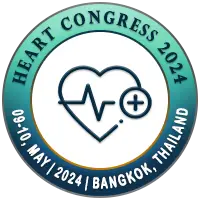
Marhisham Che Mood
Paediatric and Congenital Heart Centre/Institute Jantung Negara, MalaysiaTitle: Feasibility, safety, and efficacy of iron bioresorbable scaffold in neonates with duct-dependent pulmonary circulation
Abstract
Introduction: Ductal stenting (DS) using conventional stents are associated with increased rates of interventions on the pulmonary arteries by triggering inflammatory response (fibrosis). Bioresorbable stents seem promising by virtue of their bioresorbable nature leading to less fibrosis and lesser hardware to remove during surgical repair.
Methods: This is a single centre pilot study conducted from September 2018 to August 2019. Nine neonates with duct dependent but dual source of pulmonary blood flow who had relatively non-complex patent ductus arteriosus (PDA) morphology were included. PDA was stented using Iron Bioresorbable Scaffold (IBS AngelTM ). Standard protocols were used for follow-up following DS. Stent remnants were removed at the time of surgery and sent for histopathology and micro-computed tomography. Stent patency up to 6 months, acute stent thrombosis and embolization, in-hospital mortality, stent related major complications, any reinterventions (catheter/ surgical) and the percentage of stent material resorbed were studied.
Results: There was no acute stent thrombosis, in hospital mortality and additional procedures during same admission. Early hospital stay was complicated by overshunting hence, prolonged ICU and ventilatory support. At 6 months follow-up, 4 had patent stents and 4 had blocked/very restrictive stent flow. One patient died after one month due to respiratory cause. One patient underwent restenting at 4 months because of restrictive stent flow and severe cyanosis.
Conclusion: IBS AngelTM can be a safe alternative to conventional stents for DS in selected patients. It can be used for temporary palliation of shorter duration especially for lesions like pulmonary atresia with intact ventricular septum (PAIVS), hence reducing the possible surgical pulmonary artery interventions. However, larger randomized controlled trials are needed to validate this.
Biography
Marhisham Che Mood is a consultant paediatric cardiologist at IJN, specialising in structural and congenital heart disease diagnostic procedures, interventional procedures including complex transcatheter interventions as well as pacemaker implantations. He has been with IJN for the past 12 years and is a distinguished member of the National Heart Association of Malaysia, treasurer of the Malaysian Paediatric Cardiac Society, and a member of the Malaysian Paediatric Association and Malaysia Medical Council.

